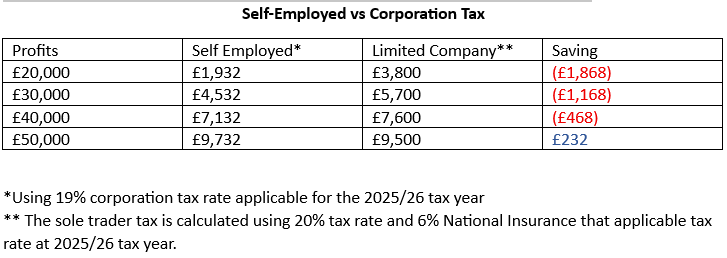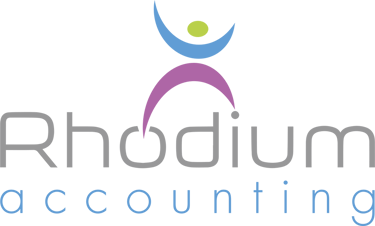Making Tax Digital for Income Tax: Is It Time to go Limited?
MAKING TAX DIGITAL FOR INCOME TAX


Making Tax Digital comes into force in April 2026 for sole traders and landlord with a gross income of £50,000 or more. That means big changes on how you report your income to HMRC. Making Tax digital means filing four quarterly returns and a final declaration, a total of five submissions, to comply. You may therefore be wondering is there an easier way? Could incorporation and becoming a Limited Company be easier to administer?
What is Making Tax Digital for Income Tax?
It is HMRC’s strategy to modernise tax by making it digital, consistent, frequent and easier to manage. So instead of one self-assessment tax return per year, if you are above the £50,000 threshold from April 2026, you will need to submit updates per quarter. You must also use an MTD – compatible software to record your income and expenses digitally.
Your traditional self-assessment tax return will disappear and be replaced by four quarterly updates and a final declaration. This changes everything about how you manage your taxes. If for example you did not use a software in the past, now you will need to register for MTD, find a Making Tax Digital compatible software, implement it and be ready to submit updates to avoid penalties.
HMRC plans to send out letters to sole traders and landlords that need to start submitting quarterly updates in February 2026. Waiting until you get is letter will leave you little or no time to prepare, so you need to determine if you will be required to adopt Making Tax for Income Tax by looking at gross earnings for the 2024/2025 tax year (i.e. from 6th April 2024 – 5th April 2025). My recommendation is therefore that you get your tax return for the 24/25 year completed as soon as possible and not wait to the 31st of January 2026 deadline. If your income for 2024/25 tax year is £50,000 and above you will come under MTD for IT from April 2026.
What about Companies?
If you are running your business using a limited company and not a sole trader, there is good news – for now. HMRC has not yet confirmed when Making Tax Digital will apply to Corporation tax but a consultation took place between November 2020 and March 2021. So, in my opinion it is going to happen and it just a matter of when. So limited companies are not required to follow MTD just yet.
Should you Incorporate to Avoid MTD?
This is a question now being asked by many sole traders and landlords. On the surface it sounds tempting, because it avoids the additional administrative burden of quarterly updates. So, could buy you some time but does it make sense in the long term?
Incorporation Isn’t just about tax, it has its own filing requirements.
In the past going limited meant saving tax, that is less true today.
Tax benefits from incorporation have shrunk, depending on how much profit you earn and withdraw, you might save very little – if anything.
Below is a summary of the tax paid by a sole trader and a limited company at different profit levels. It is clear to see that incorporation only starts to make sense at certain profit levels.
More importantly, becoming a company comes with its own admin and responsibilities; more specifically
- You will need to register with companies house.
- File annual accounts and confirmation statements.
- Submit corporation tax returns to HMRC
- Pay corporation tax.
Miss a deadline and you face fines and penalties, the same as being a sole trader.
In short, incorporation Is not a short cut to avoid responsibilities. The decision to incorporate a business should be a strategic and based on business needs.
In short, MTD will increase admin for self employed business owners and landlords. Quarterly updates mean more deadlines and more software costs but Limited companies face admin too, annual returns, annual accounts, confirmation statements and corporation tax return.
So, one of the questions to ask is ; do you want to take on new software and quarterly updates or deal with the complexity of running a company?
Let’s look at the costs :
For self-employed individuals under MTD:
Need MTD compatible software or a bridging software
You must keep digital records (this can be done on most MTD compatible software)
Submit quarterly updates (most likely you will be paying for software on a monthly basis)
For Limited Companies
One off incorporation costs.
File confirmation statement once every year.
Run a payroll if you pay yourself a salary – involves monthly software cost
So, it is clear both options require time, effort and good record keeping.
What is the bottom line?
Some businesses will benefit from going ahead with incorporation as it grows, while others will be better off embracing Making tax digital and staying self-employed.
The key is making an informed decision based on your business needs, goals and profits
If you think you are going to be required to file your self-employed income via MTD don’t worry, don’t panic but don’t bury your head in the sand. The time to act is now. The penalties and fines involved for failing to comply are a waste of money. You are better off keeping that money in your pocket.
MTD does not have to be a headache, and you don’t have to lose sleep over tax deadlines. It is an opportunity to get organised and make your business future ready.
We are here to help. Why not get in touch and we will be more than happy break down the jargon and help you get set up.
Book a call with today by contacting us below.


